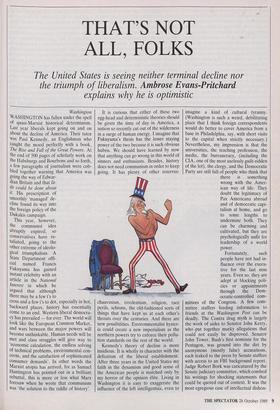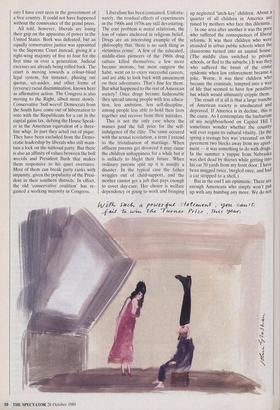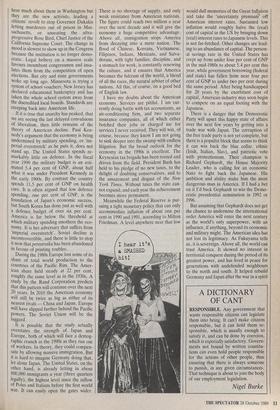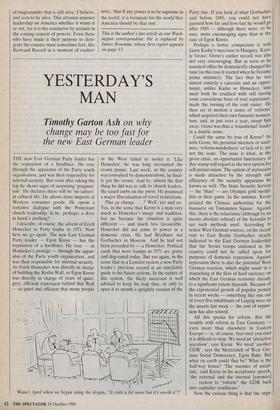THAT'S NOT ALL, FOLKS
The United States is seeing neither terminal decline nor the triumph of liberalism. Ambrose Evans-Pritchard
explains why he is optimistic
Washington WASHINGTON has fallen under the spell of quasi-Marxist historical determinism. Last year liberals kept going on and on about the decline of America. Their tutor was Paul Kennedy, an Englishman who caught the mood perfectly with a book, The Rise and Fall of the Great Powers. At the end of 500 pages of scholarly work on the Habsburgs and Bourbons and so forth, a few paragraphs of journalism were cob- bled together warning that America was going the way of Edwar- dian Britain and that lit- tle could be done about it. His prescription of smoothly 'managed' de- cline found its way into the foreign policy of the Dukakis campaign. This year, however, the communist idea abruptly expired, so conservatives have re- taliated, going to the other extreme of ideolo- gical triumphalism. A State Department offi- cial named Francis Fukuyama has gained instant celebrity with an article in the National Interest in which he argued that although there may be a few t's to cross and a few i's to dot, especially in hot, backward places, history has essentially come to an end. Western liberal democra- cy has prevailed — for ever. The world will look like the European Common Market. and wars between the major powers will become unthinkable. Human needs will be met and class struggles will give way to `economic calculation, the endless solving of technical problems, environmental con- cerns, and the satisfaction of sophisticated consumer demands'. In other words the Marxist utopia has arrived, for as Samuel Huntington has pointed out in a brilliant rebuttal, this is more or less what Marx foresaw when he wrote that communism was 'the solution to the riddle of history'.
It is curious that either of these two egg-head and deterministic theories should be given the time of day in America, a nation so recently cut out of the wilderness in a surge of human energy. I imagine that Fukuyama's thesis has the lesser staying power of the two because it is such obvious hubris. We should have learned by now that anything can go wrong in this world of sinners and enthusiasts. Besides, history does not need communism in order to keep going. It has plenty of other reserves: chauvinism, irredentism, religion, race perils, schisms, the old-fashioned sorts of things that have kept us at each other's throats over the centuries. And there are new possibilities. Environmentalist hyster- ia could create a new imperialism as the northern powers try to enforce their pollu- tion standards on the rest of the world.
Kennedy's theory of decline. is more insidious. It is wholly in character with the defeatism of the liberal establishment. After three years in the United States my. faith in the dynamism and good sense of the American people is matched only by my horror of the opinion elite. Living in Washington it is easy to exaggerate the influence of the left intelligentsia, even to
Fortunately, such people have not had in- fluence over the execu- tive for the last nine years. Even so, they are adept at blocking poli- cies or appointments through the Dem- ocratic-controlled com- mittees of the Congress. A few com- mittee staffers feeding information to friends at the Washington Post can be deadly. The Contra drug myth is largely the work of aides to Senator John Kerry, who -put together murky allegations that could not easily be disproved. Senator John Tower, Bush's first nominee for the Pentagon, was ground into the dirt by anonymous (mostly false) accusations, each leaked to the press by Senate staffers with access to an FBI background report. Judge Robert Bork was caricatured by the Senate judiciary committee, which combed his writings for shocking statements that could be quoted out of context. It was the most egregious case of intellectual dishon-
esty I have ever seen in the government of a free country. It could not have happened without the connivance of the grand press.
All told, however, liberals are losing their grip on the apparatus of power in the United States. Bork was defeated, but an equally conservative justice was appointed to the Supreme Court instead, giving it a right-wing majority of five to four for the first time in over a generation. Judicial excesses are already being rolled back. The court is moving towards a colour-blind legal system, for instance, phasing out quotas, set-asides, and other forms of (reverse) racial discrimination, known here as affirmative action. The Congress is also moving to the Right, albeit more slowly. Conservative 'boll weevil' Democrats from the South have come out of hibernation to vote with the Republicans for a cut in the capital gains tax, defying the House Speak- er in the American equivalent of a three- line whip. In part they acted out of pique. They have been excluded from the Demo- cratic leadership by liberals who still main- tain a lock on the national party. But there is also an affinity of values between the boll weevils and President Bush that makes them responsive to his quiet overtures. Most of them can break party ranks with impunity, given the popularity of the Presi- dent in their southern districts. In effect, the old 'conservative coalition' has re- gained a working majority in Congress. Liberalism has been contained. Unfortu- nately, the residual effects of experiments in the 1960s and 1970s are still devastating. The core problem is moral relativism, the loss of values anchored in religious belief. Drugs are an interesting example of the philosophy that 'there is no such thing as victimless crime'. A few of the educated, middle-class pioneers of the 1960s drug culture killed themselves; a few more became morons; but most outgrew the habit, went on to enjoy successful careers, and are able to look back with amusement on their adventures. That's fine for them. But what happened to the rest of American society? Once drugs became fashionable they spread among people with less educa- tion, less ambition, less self-discipline, among people less able to hold their lives together and recover from their mistakes.
This is not the only case where the masses paid. the full price for the self- indulgence of the elite. The same occured with the sexual revolution, a term I extend to the trivialisation of marriage. When affluent parents get divorced it may cause the children unhappiness for a while but it is unlikely to blight their future. When ordinary parents split up it is usually a disaster. In the typical case the father wriggles out of child-support, and the mother cannot get a job that pays enough to cover day-care. Her choice is welfare dependency or going to work and bringing
up neglected latch-key' children. About a quarter of all children in America are raised by mothers who face this dilemma. In one area after another it was the poor who suffered the consequences of liberal reforms. It was their children who were stranded in urban public schools when the classrooms turned into an animal house. (The middle class switched to private schools, or fled to the suburbs.) It was they who suffered the brunt of the crime epidemic when law enforcement became a joke. Worse, it was their children who became the criminals, tempted into a way of life that seemed to have few penalties but which would ultimately cripple them.
The result of it all is that a large tranche of American society is uneducated and depraved. If America is in decline, this is the cause. As I contemplate the barbarism of my neighbourhood on Capitol Hill I sometimes wonder whether the country will ever regain its cultural vitality. (In the spring a teenage boy was 'executed' on the pavement two blocks away from my apart- ment — it was something to do with drugs. In the summer a yuppie from Nebraska was shot dead by thieves while getting into his car 50 yards from my front door. I have been mugged twice, burgled once, and had a car stripped to a shell.) But in the end I am optimistic. There are enough Americans who simply won't put up with any humbug any more. We do not
hear much about them in Washington but they are the new activists, leading a citizens' revolt to stop Governor Dukakis letting murderers out of prison in Mas- sachusetts, or unseating the ultra- progressive Rose Bird, Chief Justice of the California Supreme Court. The change in mood is slowest to show up in the Congress because the institution is no longer demo- cratic. Legal bribery on a massive scale favours incumbent congressmen and insu- lates them from the competition of open elections. But city and state governments woke up long ago. Minnesota is trying a system of school vouchers; New Jersey has declared educational bankruptcy and has taken the whole school system away from the discredited local boards. Standards are creeping back into American life.
If it is true that anarchy has peaked, that we are seeing the last delayed convulsions of liberalism, then little remains of the theory of American decline. Paul Ken- nedy's argument that the economy is being undermined by military spending, or 'im- perial overstretch' as he puts it, does not stand up. The United States spends re- markably little on defence. In the fiscal year 1990 the military budget is an esti- mated 5.4 per cent of GNP, about half what it was under President Kennedy in the early 1960s. By contrast the country spends 11.5 per cent of GNP on health care. It is often argued that low defence spending, one per cent of GNP, is the foundation of Japan's economic success, but South Korea has done just as well with a defence budget of over six per cent. America is far below the threshold at which military spending smothers the eco- nomy. It is her adversary that suffers from `imperial overstretch'. Soviet decline is incontrovertible, and there is little to stop it now that perestroika has been abandoned in favour of printing roubles.
During the 1980s Europe lost some of its share of total world production to the countries of the Pacific Rim. The Amer- ican share held steady at 22 per cent, roughly the same level as in the 1930s. A study by the Rand Corporation predicts that this pattern will continue over the next 20 years. In 2010 the American economy will still be twice as big as either of its nearest rivals — China and Japan. Europe will have slipped further behind the Pacific Powers. The Soviet Union will be the laggard.
It is possible that the study actually overstates the strength of Japan and Europe, both of which will face a demog- raphic crunch in the 1990s as they run out of workers. In theory, they could compen- sate by allowing massive immigration. But it is hard to imagine Germany doing that, let alone Japan. The United States, on the other hand, is already letting in about 800,000 immigrants a year (three quarters legally), the highest level since the inflow of Poles and Italians before the first world war. It can easily open the gates wider.
There is no shortage of supply, and only weak resistance from American nativists. The figure could reach two million a year over the next decade and it will give the economy a huge competitive advantage. Above all, immigration stops America from decaying into a mere nation. The flood of Chinese, Koreans, Vietnamese, Filipinos, Indians, Mexicans, and Salva- dorans, with tight families, discipline, and a stomach for work, is constantly renewing the culture, and it ensures that America becomes the fulcrum of the world, a blend of all the races, the natural arbiter of other nations. All this, of course, on a good bed of English law.
I have my doubts about the American economy. Services are pitiful. I am cur- rently doing battle with tax accountants, an air-conditioning firm, and two separate insurance companies, all of which either botched their jobs or charged me for services I never received. They will win, of course, because they know I am not going to sink deeper into the swamp with endless litigation. But the broad outlook for the economy in the 1990s is excellent. The Keynesian tax brigade has been routed and driven from the field. President Bush has held to his pledge of no new taxes, to the delight of doubting conservatives, and to the amazement and disgust of the New York Times. Without taxes the state can- not expand; and each year the achievement becomes more permanent.
Meanwhile the Federal Reserve is pur- suing a tight monetary policy that can only accommodate inflation of about one per cent in 1990 and 1991, according to Milton Friedman. A level anywhere near that low would dull memories of the Great Inflation and take the 'uncertainty premium" off American interest rates. Sustained low inflation would roughly halve the (real) cost of capital in the US by bringing down (real) interest rates to Japanese levels. This is not far-fetched. Other changes are lead- ing to an abundance of capital. The person- al savings rate in the United States has crept up from under four per cent of GNP in the mid-1980s to about 5.4 per cent this year, while government borrowing (federal and state) has fallen from near four per cent of GNP to under two per cent during the same period. After being handicapped for 20 years by the exorbitant cost of capital, American industry may soon begin to compete on an equal footing with the Japanese.
There is a danger that the Democratic Party will upset this happy state of affairs over the next few years by getting into a trade war with Japan. The corruption of the free trade party is not yet complete, but there is a populist block that seems to think it can win back the blue collar, ethnic (Irish, Italian, Slav), and patriotic vote with protectionism. Their champion is Richard Gephardt, the House Majority Leader, who is calling for an economic Nato to fight back the Japanese. His ambition and ability make him the most dangerous man in America. If I had a bet on it I'd back Gephardt to win the Demo- cratic presidential nomination in 1992 or 1996.
But assuming that Gephardt does not get the chance to undermine the international order America will enter the next century as the world's only superpower, with an influence, if anything, beyond its economic and military might. The American idea has not lost its legitimacy. As Fukuyama tells us, it is sovereign. Above all, the world can trust America. It showed no interest in territorial conquest during the period of its greatest power, and has lived in peace for generations with undefended neighbours to the north and south. It helped rebuild Germany and Japan after the war in a spirit of magnanimity that is still alive, I believe, and seen to be alive. This altruism imposes leadership on America whether it wants it or not, for it is the conductor by acclaim in the coming concert of powers. Even those who have made it their purpose to deni- grate the country must sometimes feel, like Bertrand Russell in a moment of exuber-
ance, 'that if any power is to be supreme in the world, it is fortunate for the world that America should be that one'.
This is the author's last article as our Wash- ington correspondent. He is replaced by James Bowman, whose first report appears on page 13.





































































 Previous page
Previous page